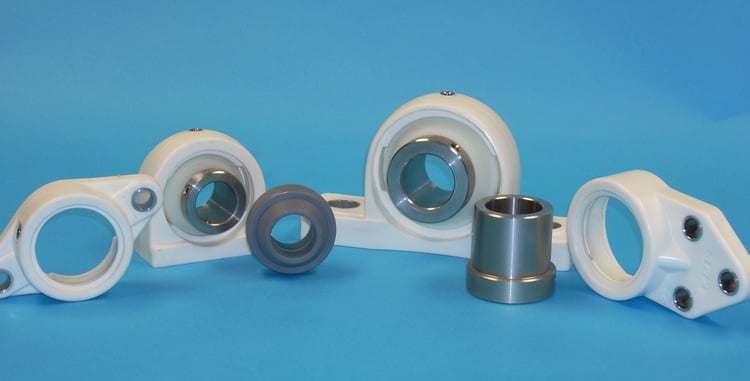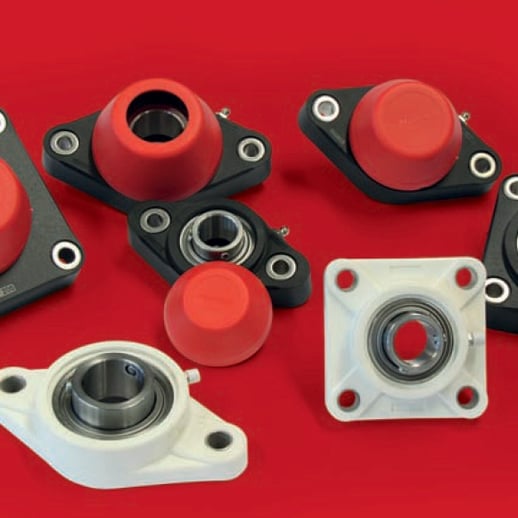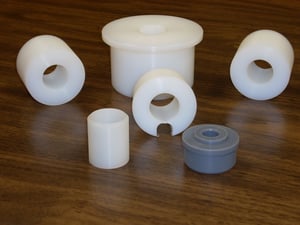 Why would you use plastic bearings and bushings? Depending on the application, choosing to use plastic over metal materials can offer exceptional advantages. Plastic bearings contribute to longer life, reduced maintenance costs, and lower energy consumption.
Why would you use plastic bearings and bushings? Depending on the application, choosing to use plastic over metal materials can offer exceptional advantages. Plastic bearings contribute to longer life, reduced maintenance costs, and lower energy consumption.
What are Plastic Bearings?
Plastic ball bearings are bearings built from plastics, such as nylon, acetal, and PTFE. They can be self-lubricating when combined with carbon graphite and other non-metallic materials.
These types of bearings were a necessary development to replace metallic bearings in applications with a higher risk of corrosion, electrical conduction, and magnetism.
For instance, they were not ideal for food processing, swimming pools, and applications in the medical field. Also, they can be easily machined to fit various applications and absorb shocks better than metal, since plastics are naturally elastic.
Types of Plastic Ball Bearings

1. Single-row deep grove plastic ball bearings
This type of bearing (no matter the material) has a wide range of applications. This is because they are built to withstand heavy loads and high operating speeds.
In applications where the load is both axial (acting along the shaft) and radial (acting around the side of the shaft), deep groove ball bearings have proven to be dependable. Although the amount of axial load capacity is limited. But when built of plastic, this gives a silent and smooth bearing.
2. Thrust plastic ball bearings
This is a type of rotary bearing built specifically for axial load, not radial loads. They are available as single direction or double direction thrust ball bearings and are designed to support thrust loads at high speeds. The plastic variant of thrust ball bearings makes them the best option for high-precision use.
3. Angular contact plastic ball bearings
Angular contact bearings have their bearing axis at an angle with the line of action of the load. And this load could be radial or thrust loads. But the thrust can only be in one direction. They’re ideal for high-speed applications.
4. Self-aligning plastic ball bearings
How can a plastic ball bearing be self-aligning? When its outer ring’s trajectory is spherical. The center of curvature of the bearing matches the center of the bearing. This allows the inner ring, ball, and retainer to rotate freely around the bearing center. And that’s how it aligns itself.
They can correct shaft misalignment more than any other type of plastic ball bearing and that’s what makes them popular for sophisticated devices these days.
5. Miniature plastic ball bearings
As the name suggests, they’re smaller versions of plastic bearings and are required for small diameter parts and lighter applications. Even though they’re small, they’re built to support the load they bear and perform well in high-precision equipment and applications too small for other types of plastic bearings.
Why Bearings Made of Plastic Are Cost-Saving and Durable
Most engineers and technicians don't expect plastic ball bearings to be as reliable as their metallic counterparts. But the opposite is the case. While this kind of bearing can withstand heavy loads, high-speed and high-temperature applications, they also provide corrosion resistance that helps put less pressure on maintenance teams.
And there are more advantages of plastic bearings:
 1. Reduce weight
1. Reduce weight
Plastics are significantly lighter than the carbon or stainless steel used in most bearings. This weight can be up to 20% lighter than normal steel bearings — like in Slideways plastic materials.
2. Provide better energy efficiency
The lighter weight of the plastic materials plus the elimination of seal drag (a disadvantage of metal bearings) makes it so that you spend less energy to operate your equipment.
3. Eliminate the need for lubrication
Slideways Plastic Bearings are self-lubricating, eliminating the cost of lubrication and the manpower to constantly grease or oil ball and roller bearings.
4. Operate in strong chemicals and other harsh environments
Self-lubricating plastic bearings are designed to meet the needs of some of the most difficult environments. The variety of plastic materials that Slideways uses in our bearings and bushings can stand up to daily washdown and exposure to harsh chemicals. They eliminate seal failure and grease contamination in these tough applications.
Slideways Plastic Bearings and Bushings are best suited to light and moderate duty applications. PV calculations should be done for heavier duty applications.
Need to Talk to Plastic Bearings Experts?
Do you have a machinery or conveyor problem? Our team at Slideways loves a challenge! We have helped hundreds of companies resolve machine and conveyor belt problems.
Email us or call us for your next solution at 1-800-298-7543 or visit our Resource Center online.


